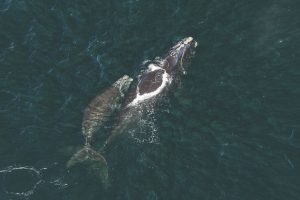First, less ice cover means more waves and wind. The ambient background sound created by these forces can make it harder for whales to communicate. It’s like trying to have a conversation in a noisy pub instead of a quiet library.
Whales in the Arctic also have to contend with ship noise — to continue with the pub analogy, that’s the equivalent of the guy who barges in talking at the top of his lungs, drowning out that perfectly crafted anecdote you were relating to your tablemate. And ships are increasing as less ice makes it easier to navigate waters that were once too treacherous for anything but ice-hardened vessels. The Arctic is still not a place for totally smooth sailing, but ship traffic is already growing rapidly as this becomes the shortest shipping route between Asia and Europe.
Our research has shown that whales can hear ships as much as 100 kilometres away and studies have shown that they move away when a ship is as much as 50 kilometres away. These findings indicate that whales may be losing valuable feeding time, or may find it more difficult to keep in touch with their offspring or pod when ship noise reaches high levels.
Sound travels differently in water than air: it travels much further in water, a characteristic whales have used to their advantage for long-distance communication. But this turns into a disadvantage when it comes to ship noise being heard throughout a large area around a moving vessel.
A sound library helps us compare marine sounds in different environments. It can also show us what might be in store for the Arctic in the future by allowing us to listen in on much noisier ocean soundscapes — such as the Atlantic, where right whales must navigate changing water temperatures, moving food supplies and ship traffic, often with dire consequences. And just as your modern librarian is not the shushing bibliophile of old, we are not just passive listeners. We have used the knowledge we have gained from listening to Arctic whales to call for speed limits for ships, which can both reduce collision risk and lower noise levels, and for the shifting of shipping routes away from key whale gathering areas, including marine protected areas.
WCS Canada is using our team’s research to call for proactive steps to be taken to lower noise impacts on one of the world’s least disturbed marine environments — before noise levels start to interfere with Arctic animal behaviours, from feeding to migration patterns. This work has already contributed to Transport Canada issuing a voluntary “Notice to Mariners” calling for ships to slow down in certain sensitive regions. We have also recommended the use of marine mammal spotters on ships transiting the Arctic and continued monitoring of the impact of growing ship traffic on whales.
On a global scale, the GLUBS project will allow researchers to explore everything from the regional dialects of whale song, to sounds that have yet to be matched to the animal that makes them, to the reactions of animals after natural disasters like hurricanes.
Libraries are about knowledge and provide us with opportunities to learn from insights gathered from around the world. What we can learn from our sound library, and now from GLUBS, is the importance of taking steps now to reduce the impacts of climate change and ships on one of the quietest places on Earth.






